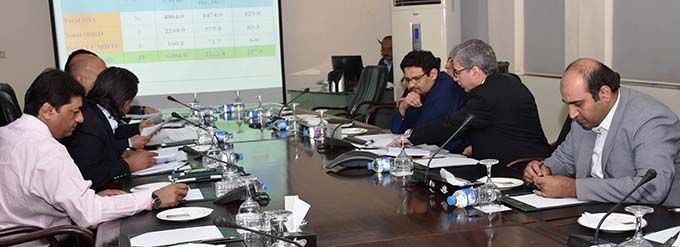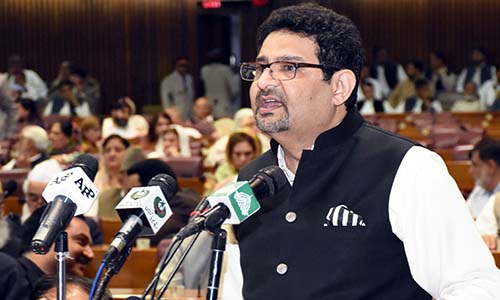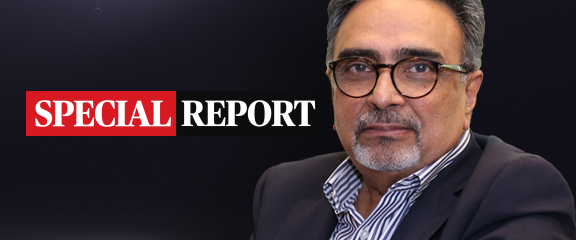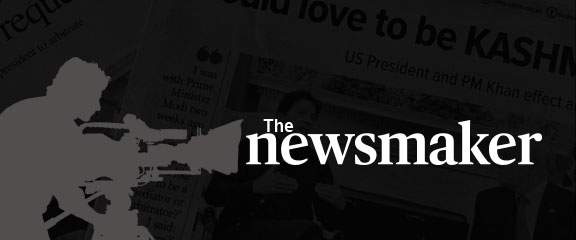Former Finance Minister, Dr. Miftah Ismail, belongs to a leading business family, which has been in the confectionery business since the early 1950s. His family owns factories in three of the four provinces of Pakistan – Sindh, Punjab and Balochistan – and has a stake in a provincial bank in the fourth – Khyber-Pakhtunkhawa. “All our investments and business interests are in Pakistan. We live and die in this country and Alhamdolillah we remain committed to it,” he told Narratives at his business office in Karachi. That makes him stand apart from many of those businessmen-cum-politicians who own mega properties and businesses abroad, including many of his colleagues in the ruling Pakistan Muslim League-Nawaz (PML-N), including the Sharif family.
Even many of the PML-N’s critics acknowledge that Ismail made the right choices and decisions in both his brief stints as Finance Minister – first in Prime Minister Shahid Khaqan Abbasi’s cabinet (December 2017- May 2018), and then in Prime Minister Shehbaz Sharif’s cabinet (April-September 2022) – under difficult circumstances.

It was the second stint as FM that proved much more challenging for Miftah Ismail than the first, given the desperate economic conditions of the country. He was compelled to make difficult decisions, which though correct, were unpopular. As a result, Ismail had to face a barrage of criticism. However, the deepest cut was not inflicted by political rivals, but by his own party men, including Ishaq Dar and his cheerleaders in the PML-N.
Miftah Ismail, who is a PhD in Public Finance & Political Economy from the Wharton School of Business, University of Pennsylvania, talks to Narratives about the country’s economic challenges as well as the challenges he faced as Finance Minister. Extracts from the interview…
■ Until Imran Khan was in power, the economy appeared on the right track, but as soon as the PDM government assumed power in April 2022, things started spiralling downwards?
Dr. Miftah Ismail: Even when Imran Khan was in power, inflation was hovering between 12-13 percent. Although that doesn’t seem like much today, at that time it was considered very high. Under Khan, economic growth slowed down. Finance Minister Hafeez Sheikh was replaced by Shaukat Tareen, who presented a budget aimed at triggering growth. The PTI government managed to achieve growth, but failed to mobilise taxes as per target and ran into problems. So, after negotiations with the IMF, the PTI government brought in a mini-budget. But in February 2022, when Imran Khan came under political pressure, he deviated from the IMF agreement and instead of raising fuel prices, which were going up internationally, he decreased them. This raised Pakistan’s default risk.
For Pakistan, there is no escape from the IMF because we need at least $20 billion annually for debt payments. We also had a current account deficit of $17.5 billion. This means without going to the IMF, Pakistan had no means of raising this amount.
■ Wasn’t the PTI government forced to slash petroleum prices because of pressure from the opposition? And at that time, yours was one of the voices heard criticising the government on all such issues.
MI: There was political pressure on Imran Khan, but this does not mean that you impale the economy to ward it off. You cannot sacrifice the state to save your politics. In Britain, three prime ministers were changed in quick-succession because of political pressure, but they did not go on to destroy the British economy. If global oil prices are on the rise, how can you sell it cheap? Tell me, did any MNA vote against Imran Khan because of the price of oil? He was not ousted because of the price of oil. So what was the need for Imran Khan to take such a populist measure? This cannot be justified.
When the PDM came to power, Prime Minister Shehbaz Sharif, and I as Finance Minister, took difficult decisions. I always said that we would keep the state interest supreme rather than our political interests. And by the grace of God, we prevented the country’s looming default on its foreign debt repayments. When I say difficult decisions, it means the ones which increased the difficulties of the people. And on television, I apologised to the people for all their misery and pain. I told them “it is every Finance Minister’s resolve to ensure growth and bring inflation down, but I can’t do so because I have to save Pakistan from default.” Had we not taken those decisions in April to June, the country would have defaulted. Even then, there was some delay on our part as Dar sahib, for his personal ambitions, did not want us to take those decisions. But once we took those difficult decisions and brought the country back on track, pushing it off the track again is beyond my comprehension.
■ The PTI says that if it had been allowed to complete its term, the economic situation would not have worsened, as has happened after the ouster of its government.
MI: Had the PTI government not violated the agreement with the IMF, things would have remained on track. There would have been a little increase in inflation because of the rise in international oil prices — 120 from 90 dollars a barrel — but we would have survived. The greatest blunder was lowering the prices of petroleum products when oil and gas prices were surging the world over.
You can judge our decision-making yourself, and then point out a single major decision about which it can be said that Miftah Ismail was wrong. Can anyone say that we were wrong in increasing the oil prices or reviving the IMF programme?

The PTI’s Finance Minister, Shaukat Tareen, agreed with the IMF that Pakistan would raise the PDL (Petroleum Development Levy) by four rupees and sales tax by 2.0 percent every month. When I went to the IMF, we had decided not to raise the sales tax, but raise the PDL by five rupees. There are only minor differences between what the PTI had agreed with the IMF and what we did. Where was I wrong? Had the PTI been in government, it would have done the same as we did. I know for a fact that Shaukat Tareen had told Imran Khan that they should revive the stalled IMF programme as soon as they won the vote of confidence in April.
■ What major deviations has Ishaq Dar done as Finance Minister since you left?
MI: The IMF did not take Ishaq Dar’s statements — which he had been making for months before he became the Finance Minister — positively, because he has a history of unsound economic policy about exports and foreign exchange. Secondly, all of Dar’s talk of bringing the dollar to a 200 rupee level, or even less, and the way he artificially capped the currency when the dollar was rebounding, had a lot of negative consequences. Then, the IMF had only agreed with us to defer the raising the electricity tariff, but Dar waived the tariff without funding it. He even sold electricity at the reduced cost of Rs.20 per unit to the industry for the whole year without funding it. In this way he was not very different from Tarin who also gave unfunded petrol subsidy. When I was Finance Minister, I had promised the Prime Minister that I would also give power subsidies, but simultaneously, I would come up with 80 billion rupees worth tax proposals and give him two or three options to choose from. But Dar sahib did not go for additional taxation. After becoming Finance Minister, he neither raised the prices of petroleum products, nor imposed taxes as decided until it was a little too late.
■ What impact on the economy have Dar’s decisions had?
MI: Firstly, the IMF programme was not reviewed in end-September, which increased our substantially default risk. When Pakistan’s default risk increased, investors and businesspeople started converting their rupees into dollars. This created a new demand for dollars. Pakistanis, who invested in land and property for instance, started purchasing dollars or gold. Selling land in Karachi these days is difficult. Whoever has cash and savings is buying dollars. When you create such a huge dollar-demand, your problems aggravate. The rupee came under pressure and got devalued. Then pegging the dollar at 228 to 230 rupees was a wrong decision. The lucky importer, who managed to have his LC (letter of credit) opened, considered the replacement cost of dollars at 270 rupees or so and priced his goods accordingly and not at the subsidized rate at which SBP sold him the dollars. This means that the trick of keeping the dollar at artificially low levels did not work, as inflation remains in line with the real market value of the greenback.
■ Before the vote of no-confidence, I clearly remember you saying “the economic conditions are so bad that there is no point in taking over the government.” Since you were clearly aware of the situation, why did you take up the assignment?
MI: Shehbaz Sharif sahib understands the economy. He was aware of the situation, but realised its full gravity only after coming to power. Imran Khan kept the electricity and gas tariffs the same for more than a year. But, as they say, when it rains, it pours, and the Ukraine War pushed the prices of crude oil and gas up. Then came the floods. Sindh lost its entire cotton crop, and half of the rice crop was also lost. Additionally, there were many other problems we had to face.
There was a rush to oust Imran Khan because the PML-N feared General Faiz Hameed. They thought if Imran Khan stayed in power, he would appoint Faiz as the army chief, and he would again do in 2023 what he did with the PML-N in 2018 — i.e. steal the elections. Our leadership was convinced that General Faiz must not be allowed to become army chief. Therefore, they took the plunge, despite the economic challenges.
■ How did the PML-N manage to lure General Bajwa on to its side? Why did the institution turn against Imran Khan?
MI: There was a time when the institution thought that Nawaz Sharif had stolen Rs.100 billion, and had one billion dollars stashed somewhere in Singapore. There were all kinds of allegations. The institution was against Nawaz Sharif. Even now, many (in the institution) do not like Nawaz Sharif. However, the institution soon saw that Imran Khan does not have any work ethics. He came to the office at 11 am or 12 noon and left before the Maghrib prayers. If there were six meetings a day, five were on media management. There was no competence at any level. There was obduracy about Usman Buzdar remaining the Chief Minister of the Punjab. Buzdar was the wrong choice, even if just for keeping the PML-N at bay in the Punjab because Shehbaz Sharif had performed well there during his 10-years as chief minister. Before him, even Chaudhry Pervaiz Elahi had done fairly well.
Aside from Usman Buzdar, there was a stubbornness about keeping Mahmood Khan as KP Chief Minister. And ironically, Mahmood is of the same quality as Buzdar. But as Punjab is covered more in the media, Buzdar remained the focus. In a nutshell, Imran Khan had been annoying the institution for some time. Then General (Qamar Javed) Bajwa realised that General Faiz had been crossing many lines as DG ISI, which was making the institution controversial. Perhaps General Faiz did what he did with Bajwa’s permission, but it was not good for the institution.
When they barged inside Maryam’s bedroom in a Karachi hotel, and sent the rangers and picked up the IG, it meant that the institution was playing way out of line. Going inside the bedroom of the daughter of the opposition leader was a mistake. And why? Just because slogans were raised inside the Quaid-e-Azam’s mausoleum. The army should not resort to such tactics. In October General Bajwa tried to remove General Faiz, but Imran Khan obstructed the transfer, embarrassing the sitting chief. After that the chief decided that it was all too much and so Imran was removed. It was not the PDM, but the institution which brought Imran Khan down.
■ Are politics being conducted at the cost of the economy now?
MI: The situation is distressing. One day Fawad Chaudhry speaks against the ECP, the next day he gets arrested. Fawad should not have spoken against the families of the ECP officials and the ECP should not have had him arrested. They should have just sent a notice, but an entire spectacle was created. He was handcuffed, which should not have been done. Sadly, when (the PML-N’s) Nehal Hashmi was arrested, Imran Khan and Fawad Chaudhry expressed pleasure. We all have to increase our tolerance level. We must speak a bit carefully and never target families. Institutions should also act with restraint.
At a time when the economy is drowning, we are busy arresting people, playing the no-confidence game, creating controversies over the appointment of the caretaker Chief Minister, etc. It seems that there is no link between politics and the economy. Today, our only focus should be the economy and nothing else. However, both the PTI and the PDM are talking about everything else, but the economy.
Secondly, if Dar is ready and the PM also wants to revive the IMF programme, then why this delay? The IMF wants this and so do all the friendly countries. So let’s do it. Bring the IMF in and make decisions.
■ Has the economic crisis been aggravated because of Dar? Why is he dragging his feet on the IMF?
MI: To an extent, it is an ego problem, and to an extent a misunderstanding of the economy. You want the IMF to come, and the IMF is asking us to take some measures first. So take those measures, and move forward. I fail to understand the paralysis.
This paralysis is hurting the economy. Our remittances are down by almost 10 percent. Every month 300-400 million dollars are lost. We would have been in better shape if through remittances we had 1.2 billion dollars more in our reserves. Our exports are suffering. Had we earned a billion more through exports, our reserves would be slightly higher. Because they failed to make a timely deal with the IMF, three or four foreign banks took away their loans – around 2.0 billion dollars — rather than rerolling their deposits. Today, had we gone for slightly better policies, our reserves would have easily been at 8.0 or 9.0 billion.
■ What is Dar’s obsession with the exchange rate?
MI: When you don’t keep the exchange rate realistic, you make imports cheap. It reduces inflation temporarily and results in short-term political gain. But this policy is not sustainable. Last time when Dar pegged the dollar at 105, our exports-to-GDP ratio came down to 8.5 from 13 percent.
■ Curtailing imports at the time of a crunch is understandable, but isn’t it a huge mess now that thousands of containers are stuck at the port and opening LCs has become an ordeal?
MI: When I was Finance Minister, we reduced the imports of those items for which we did not have money. We slashed the imports of cars, mobile phones and electrical appliances to half. We did not impose restrictions on any other item. Out of the 100 chapters on customs, we imposed restrictions on only two.
During Imran Khan’s period, a lot of machinery was imported, but we weren’t able to provide gas and electricity to them. So we stopped machinery imports and halted the installation of new factories— but we allowed under construction factories to finish. We wanted those factories, which are in operation, to continue to function. I used to engage with the business community on a daily basis and hold two or three meetings a week with officers of the relevant ministries. Now these meetings are not being held. Therefore, around 8,000 to 8,500 containers are piled at the port. This is creating a lot of problems. Some factories have closed down, while others are slashing their shifts and staff. Because of this, the economy has slowed down.
■ What should the roadmap for economic recovery be?
MI: The immediate challenge is to take the bitter pill and revive the IMF programme without any delay.
For the future roadmap, we have launched the initiative of ‘Reimaging Pakistan.’ Along with me, Shahid Khaqan Abbasi, Fawad Hasan Fawad, Mustafa Nawaz Khokar, Zafar Mirza, Asad Ali Shah, Lashkar Raisini and many other friends are part of this initiative. We have representation from every province. Pakistan faces two mega problems. The first is that Pakistan is not working for Pakistanis. To give just one example: Today, 86 per cent of Pakistani children are malnourished, and 50 percent are out of school.
The second problem is our debt burden. Every year, we have to repay 20 billion dollars under this head. The only solution is that our exports should be higher than imports so that we can earn more dollars and return the debt. What we are doing now is taking money from country ‘A’ to give to country ‘B,’ or from institution ‘X’ to give to institution ‘Y.’ The sun has to set on this practice one day. And that day has come. At some point we have to change our policies and rethink and reimagine Pakistan.
■ Is it possible to turn the economy around without first bringing political stability?
MI: We can make some immediate fixes but for long-term growth politics should be settled. Without it, long-term and high growth is not possible. But if you want to increase the price of petrol and leave the dollar rate to be determined by the market, you can do so even now without political stability.
■ You have been criticised a lot by members of your own party. Are you still committed to the PML-N?
MI: God Almighty has been kind, and my party has reposed trust in me to appoint me Finance minister twice. But it is not necessary that one should always be in politics or run in the elections. I can serve the country in other ways too. I remain committed to the party, but I have no plans to contest elections now.
■ Are you heart-broken by all the criticism you face by your own party colleagues?
MI: It does not bother me because I know who is responsible for this and what the motive has been. But I have been pained by the way a couple of television shows were sponsored against me. I think I deserved better treatment from the party.
■ There is speculation that the ‘Reimagining Pakistan’ initiative is a step towards the formation of a new political party.
MI: This is not the intention. Our intention is to document where Pakistan stands right now, where we want to take it, and suggest a way to do it. It can work as a political pressure group, which can ask the PTI, the PML-N, the PPP and others to take a direction to make the country move forward.
If a party in power initiates privatisation tomorrow, then we can ask others to support this decision, which will be a correct one. We are working to create a consensus and do not want to form a new party. But even if a new political party is formed, there should be no problem with it. Forming a political party is our right, but this is not what we are trying to do. Shahid Khaqan will contest the next elections on a PML-N ticket, Nawaz Khokar will run as an independent candidate, while I will stay away from elections.
■ Some senior PML-N leaders say that if it is a PML-N government, then Ishaq Dar has to be the Finance Minister. They contend that Miftah Ismail should have known that he was brought as FM on a temporary basis.
MI: Whether I am the Finance Minister or not, I have two questions: Why should Dar be the Finance Minister? Why should he alone hold this position? Why not Ahsan Iqbal, Khurram Dastagir Khan, Khawja Asif… and there are many others. Why only Ishaq Dar? Nominating Miftah Ismail as Finance Minister or removing him was at the Prime Minister’s discretion. I have absolutely no issue with that. The only reservation I have is that they should have done it in a better way.
■ Now people are talking more and more about the curse of dynastic politics. What are your views about this?
MI: Take it this way: Baccha Khan led the Khudai Khidmatgar, which later became the NAP headed by his son Wali Khan. When the NAP was banned, they made the NDP, which was headed by Sher Baz Mazari, but it was Begum Naseem Wali who actually ran the show. Then, the ANP was led by Baccha Khan’s grandson, Asfandyar Wali, and his son, Aimal, will be its next leader. The Bilour and Hoti families are also part of the ANP, but the next leader will be Aimal.
Similarly, the Jamiat Ulema-e-Islam was led by Mufti Mehmood, then by Maulana Fazal-ur Rehman. His son Asad and brother Atta, hold important positions in the party, and Maulana Fazal’s ‘samdhi’ is Governor KP.
All the Baloch sardars run their parties in a similar fashion….in the PPP, there was Zulfikar Ali Bhutto, Begum Nusrat, Benazir Bhutto, Asif Ali Zardari, his sisters, and now his son Bilawal. In the PML-N, there is Nawaz Sharif and his family, which includes his son-in-law Capt. Safdar, who is the President of the youth wing.
Although Imran Khan’s family is not in politics, the PTI is his fiefdom. He is the king. Imran cites examples of Britain, but over there, after the loss of one election, the party head changes. When you say that it is wrong for only one family to ?rule the party or the country, in the same way it is equally wrong to say that only one person remains capable of leading the party and the country. Regarding the PTI, only Imran Khan is the king, and others do not matter. If Imran’s children were to come here, it would also become a dynastic party. Similarly, the PTI has Shah Mehmood Qureshi and his daughter, Pervaiz Khattak and his family…
Only the Jamaat-e-Islami is different, in which Naeem-ur Rehman can develop himself as a brand. But in the PTI, Khurram Sher Zaman cannot brand himself. Only Imran Khan has this privilege. Any party, which is monarchical or dynastic, is not good for Pakistan.



